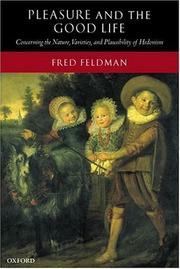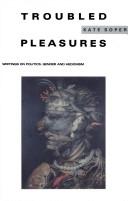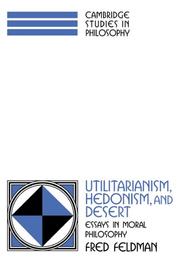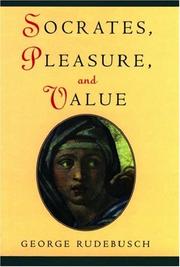| Listing 1 - 10 of 11 | << page >> |
Sort by
|
Book
Year: 1971 Publisher: Brussel Universitaire Uitgaven
Abstract | Keywords | Export | Availability | Bookmark
Book
ISBN: 9781107046658 9781107110618 9781107624658 Year: 2015 Publisher: Cambridge [etc.] Cambridge University Press
Abstract | Keywords | Export | Availability | Bookmark
 Loading...
Loading...Choose an application
- Reference Manager
- EndNote
- RefWorks (Direct export to RefWorks)
"Plato often rejects hedonism, but in the Protagoras, Plato's Socrates seems to endorse hedonism. In this book, J. Clerk Shaw removes this apparent tension by arguing that the Protagoras as a whole actually reflects Plato's anti-hedonism. He shows that Plato places hedonism at the core of a complex of popular mistakes about value and especially about virtue: that injustice can be prudent, that wisdom is weak, that courage is the capacity to persevere through fear, and that virtue cannot be taught. The masses reproduce this system of values through shame and fear of punishment. The Protagoras and other dialogues depict sophists and orators who have internalized popular morality through shame, but who are also ashamed to state their views openly. Shaw's reading not only reconciles the Protagoras with Plato's other dialogues, but harmonizes it with them and even illuminates Plato's wider anti-hedonism"-- "In this book, Clerk Shaw removes this apparent tension by arguing that the Protagoras as a whole actually reflects Plato's anti-hedonism"--
Hedonism. --- Hédonisme --- Plato. --- Hédonisme

ISBN: 019926516X 0191601381 9786612052996 1282052993 019153269X Year: 2004 Publisher: Oxford Clarendon
Abstract | Keywords | Export | Availability | Bookmark
 Loading...
Loading...Choose an application
- Reference Manager
- EndNote
- RefWorks (Direct export to RefWorks)
Philosophical anthropology --- General ethics --- Genot --- Hedonism --- Hedonisme --- Hédonisme --- Jouissance --- Lust (Gevoel) --- Lustgevoel --- Plaisir --- Pleasure --- Plezier --- Eudemonism --- Asceticism --- Ethics --- Philosophy --- Cyrenaics (Greek philosophy) --- Utilitarianism --- Emotions --- Senses and sensation --- Happiness

ISBN: 0860915360 0860913139 9780860915362 9780860913139 Year: 1990 Publisher: London : Verso,
Abstract | Keywords | Export | Availability | Bookmark
 Loading...
Loading...Choose an application
- Reference Manager
- EndNote
- RefWorks (Direct export to RefWorks)
Critique féministe --- Feminist criticism --- Feministische kritiek --- Hedonism --- Hedonisme --- Hédonisme --- Social values --- Sociale waarden --- Valeurs sociales --- Social Values --- Pleasure --- Feminist criticism. --- Hedonism. --- Pleasure. --- Social values.
Book
ISBN: 9780691161136 0691161135 Year: 2015 Publisher: Princeton (N.J.) : Princeton university press,
Abstract | Keywords | Export | Availability | Bookmark
 Loading...
Loading...Choose an application
- Reference Manager
- EndNote
- RefWorks (Direct export to RefWorks)
Hédonisme --- Cyrénaïques --- Hedonism. --- Cyrenaics (Greek philosophy) --- Cyrénaïques (Philosophie) --- Aristippus, --- Cyrenaics (Greek philosophy). --- Cyrénaïques (Philosophie) --- Hédonisme --- Hédonisme. --- Cyrénaïques. --- Hédonisme. --- Cyrénaïques.

ISBN: 0521591554 0521598427 1139174975 9781139174978 9780521591553 9780521598422 Year: 1997 Volume: *22 Publisher: Cambridge Cambridge University Press
Abstract | Keywords | Export | Availability | Bookmark
 Loading...
Loading...Choose an application
- Reference Manager
- EndNote
- RefWorks (Direct export to RefWorks)
Fred Feldman is an important philosopher, who has made a substantial contribution to utilitarian moral philosophy. This collection of ten previously published essays plus a new introductory essay reveal the striking originality and unity of his views. Feldman's version of utilitarianism differs from traditional forms in that it evaluates behaviour by appeal to the values of accessible worlds. These worlds are in turn evaluated in terms of the amounts of pleasure they contain, but the conception of pleasure involved is a novel one and the formulation of hedonism improved. In Feldman's view pleasure is not a feeling but a propositional attitude. He also deals with problems of justice that affect standard forms of utilitarianism. The collection is ideally suited for courses on contemporary utilitarian theory.
General ethics --- Ethics --- Ethiek --- Ethique --- Hedonism --- Hedonisme --- Hédonisme --- Utilitarianism --- Utilitarisme --- Ethics. --- Hedonism. --- Utilitarianism. --- Eudemonism --- Deontology --- Ethics, Primitive --- Ethology --- Moral philosophy --- Morality --- Morals --- Philosophy, Moral --- Science, Moral --- Philosophy --- Asceticism --- Cyrenaics (Greek philosophy) --- Pleasure --- Values --- Arts and Humanities
Book
ISBN: 2904227954 9782904227950 Year: 1996 Volume: *12 Publisher: Paris : Ed. Desjonquières,
Abstract | Keywords | Export | Availability | Bookmark
 Loading...
Loading...Choose an application
- Reference Manager
- EndNote
- RefWorks (Direct export to RefWorks)
Genot --- Hedonism --- Hedonisme --- Hédonisme --- Jouissance --- Lust (Gevoel) --- Lustgevoel --- Plaisir --- Pleasure --- Plezier --- Ethics --- Morale --- Early works to 1800 --- Ouvrages avant 1800 --- 1 DE LA METTRIE, JULIEN OFFRAY --- Filosofie. Psychologie--DE LA METTRIE, JULIEN OFFRAY --- 1 DE LA METTRIE, JULIEN OFFRAY Filosofie. Psychologie--DE LA METTRIE, JULIEN OFFRAY --- La Mettrie, Julien Offray de --- Epicureans (Greek philosophy) --- Ethics. --- Hedonism. --- Hédonisme. --- Libertinage. --- Libertinism. --- Morale. --- Philosophie française --- Philosophy, French --- Stoics. --- Stoïcisme. --- ethics (philosophy) --- stoicism. --- Épicuriens. --- 1700-1799

ISBN: 0195128559 9780195159615 9780195128550 Year: 1999 Publisher: New York (N.Y.): Oxford university press,
Abstract | Keywords | Export | Availability | Bookmark
 Loading...
Loading...Choose an application
- Reference Manager
- EndNote
- RefWorks (Direct export to RefWorks)
Ethics, Ancient. --- Pleasure. --- Hedonism. --- Ancient ethics --- Antieke ethiek --- Ethics [Ancient ] --- Ethiek [Antieke ] --- Ethiek van de Oudheid --- Ethique de l'Antiquité --- Genot --- Hedonism --- Hedonisme --- Hédonisme --- Jouissance --- Lust (Gevoel) --- Lustgevoel --- Plaisir --- Pleasure --- Plezier --- Ethics, Ancient --- Eudemonism --- Socrates --- Socrate --- Socrates Constantinopolitanus Scholasticus --- Morale ancienne --- Hédonisme --- Socrates. --- Emotions --- Ethics --- Senses and sensation --- Utilitarianism --- Happiness --- Asceticism --- Philosophy --- Cyrenaics (Greek philosophy) --- Sokrates
Book
ISBN: 2909422844 9782909422848 Year: 2004 Volume: *2 Publisher: Fougères (La Versanne) : Encre marine,
Abstract | Keywords | Export | Availability | Bookmark
 Loading...
Loading...Choose an application
- Reference Manager
- EndNote
- RefWorks (Direct export to RefWorks)
Epicurean philosphers --- Epicureanism --- Epicureans (Greek philosophy) --- Epicureeërs (Griekse filosofie) --- Epicuriens (Philosophie grecque) --- Epicurisme --- Epikureismus --- Genot --- Jouissance --- Lust (Gevoel) --- Lustgevoel --- Philosophes épicuriens --- Philosophie épicurienne --- Plaisir --- Pleasure --- Plezier --- École épicurienne --- Épicurisme --- Épicurisme (Philosophie grecque) --- Épicuréisme --- Valla, Lorenzo --- EPICURIENS --- PHILOSOPHIE GRECQUE --- HEDONISME --- VALLA (LORENZO), 1405-1457 --- PLAISIR (MORALE) --- DANS LA LITTERATURE --- OEUVRES --- 15E SIECLE --- EDITION CRITIQUE
Book
ISBN: 9789022337400 Year: 2021 Publisher: Antwerpen Manteau
Abstract | Keywords | Export | Availability | Bookmark
 Loading...
Loading...Choose an application
- Reference Manager
- EndNote
- RefWorks (Direct export to RefWorks)
De meeste en beste uren van ons volwassen leven brengen we door op het werk. Uit wetenschappelijk onderzoek blijkt dat maar liefst negen op de tien mensen zich niet betrokken voelen bij hun werk én dat veruit de meesten zich tijdens het werken niet goed voelen. Dat is slecht nieuws voor werknemers én werkgevers. Werkgeluk is immers niet alleen bepalend voor ons levensgeluk, het is onontbeerlijk voor bedrijven en overheden die goed willen presteren. In dit boek legt Dajo De Prins uit waarin werkgeluk bestaat, waarom werken velen ongelukkig maakt, waarom de oplossingen uit de ?klassieke? geluksleer niet werken en wat we dan wel moeten doen om het tij te keren. Het recentste wetenschappelijk onderzoek naar werk en geluk vormt daarbij de leidraad. Zo komt de auteur tot een reeks aanbevelingen en tips voor werkenden en organisaties. Werkgeluk is een boek voor hen die de arbeidsmarkt betreden, voor werknemers die meer voldoening in hun werk zoeken en voor bedrijven die een belangrijke bijdrage willen leveren aan het werkgeluk van hun werknemers. Het is een oproep om na de coronacrisis niet terug te vallen in oude gewoontes, maar om geluk eindelijk de centrale plaats te geven die het verdient in werk.Bron: www.bol.com
Arbeidstevredenheid --- Arbeidsmotivatie --- Arbeidsvreugde --- Werkomgeving --- Fabel --- Ontevredenheid --- Geluk --- Werkgever --- Werknemer --- 331.823 --- 331.124 --- 331.6.001 --- arbeidsveiligheid - veiligheid op het werk - veiligheidsmaatregelen - beveiliging tegen brand en beroepsgevaren - welzijn op het werk --- loopbaanplanning - loopbaanbegeleiding - coaching --- arbeidsmarktbeleid - arbeidsmarktbeheersing --- Personnel management --- personeelsmanagement --- geluk --- 367.1 Bedrijfspsychologie en -sociologie --- arbeidsomstandigheden --- welbevinden --- hedonisme --- eudemonisme --- ethiek --- 367.1 --- human resources --- bedrijfspsychologie - sociologie --- Arbeidsmotivatie. --- Arbeidstevredenheid.
| Listing 1 - 10 of 11 | << page >> |
Sort by
|

 Search
Search Feedback
Feedback About UniCat
About UniCat  Help
Help News
News